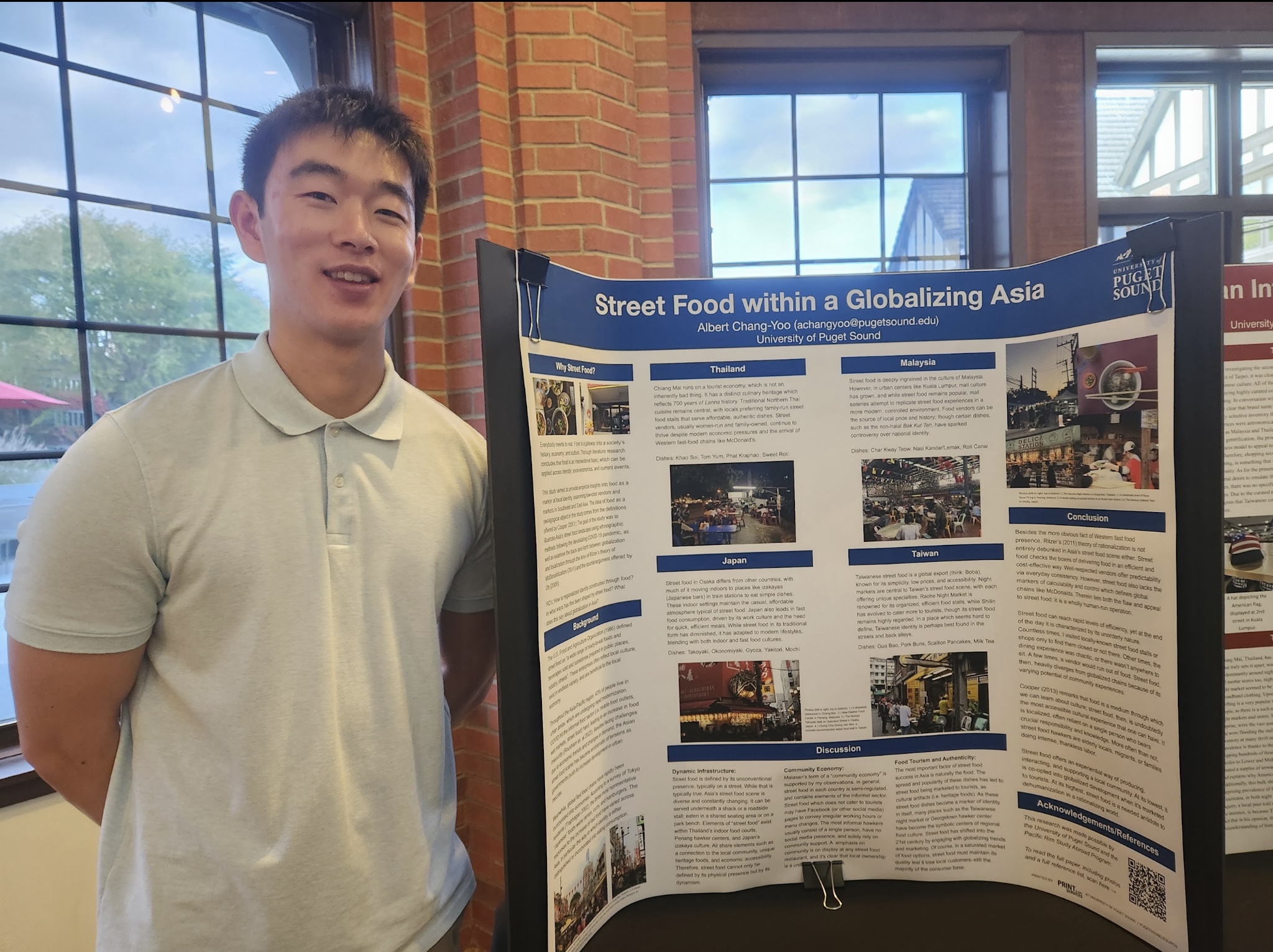
By Alika Khun
On Oct. 9 the annual PacRim Symposium, an event highlighting the accomplishments and research done by the year’s returning PacRim students, occurred. As one of University of Puget Sound’s many Study Abroad programs, Pacific Rim fosters an opportunity for students to visit various places across Asia to engage with its cultures, religions, economies, politics, and more. The symposium was held at the Rasmussen Rotunda and was very well attended with crowds including both students and faculty. The returning PacRim students hung up large poster presentations of their research and discussed what they learned during their trips. Simon Plotkin (‘25) and Albert Chang-Yoo (‘25) both talked about their experiences studying abroad in Thailand, Malaysia, Japan and Taiwan.
Chang-Yoo studied the different kinds of street food found in the four countries on PacRim’s roster, and titled his project “Street Food within a Globalizing Asia.” “I saw this as a passion project because I’ve always loved food, and because I’ve always thought that food was a great jumping-off point for studying culture. I observed all the vendors, and of course, eating the food — that was the best part,” he said with a smile.
“What I found was that there were these three overarching themes with street food,” Chang-Yoo continued. The first theme he outlined was globalization, and how he felt it might harm local culture. “But street food is this ever-changing, dynamic thing. It has evolved from being just a person on a street. It’s evolved to malls, underground bars, stalls, and there’s also this top-down approach by governments where street vendors are put into popular mandated spaces.” Chang-Yoo also brought up the idea of community economy. “Regardless of context or space, they’re supported by a very unique society. These are people you see everyday, and they provide you with accessible and cheap food. When this vendor in Malaysia wasn’t there one day, there were these posts on Facebook saying, ‘Where is this guy? I need my noodles!’ It’s very personal, you get to make all these personal connections. I have a favorite restaurant in Tacoma, sure, but it’s a very different experience.”
Chang-Yoo’s last theme was authenticity. “The question isn’t really ‘is this food authentic,’ it’s what has influenced these people to make it? What I found was that these are intersections of the economy and culture. There’s not really a simple answer to it. Street food in Asia is not predictable. It’s chaotic, but that’s kind of the fun and appeal. It’s very humanistic.”
Plotkin analyzed the effect of English as a lingua franca of Asia in his study, “Examining English Text Across Asia.” He was interested in the ways that English affected all countries, especially in the context of colonization. He mainly talked about the impact of English on tourism and how tourists “want the authentic and ethnic experience, and it contributes to the economy.” Plotkin talked about how English can be found everywhere, citing an instance in Malaysia where he saw multiple graffiti phrases written in English instead of Malay. “It’s because English is so dominant globally, it would allow the message to be broadcast further.”
Plotkin also discussed Taiwan’s 2030 Bilingual Policy. This policy suggests that all students should be bilingual in Mandarin and English by 2030. It exemplifies the differences in fluency between generations. “But that policy is being more placed in private schools, so it leads to more stratification. If you learn English you get rich, and if you don’t, you stay poor,” Plotkin said.
Plotkin mentioned how American culture has been incorporated into Japanese culture, specifically, how punk and hip-hop movements, which in the West have been a sign of rebellion in Black communities, are being adopted. Students in Japan have taken the aesthetics of hip-hop and incorporated it into the idea of youth and disconnection from Western society. He also talked about how some usages of English were random. “I found a t-shirt in Malaysia that was a quote from To Kill a Mockingbird and big Mary Oliver quotes on the walls. It was so weird!” He laughed. “It’s like a decontextualization of culture and media. The fictionalized vision of America is so strong. Every time I asked people where their dream destination to travel was, they said America, and I was like, ‘Go somewhere else!’,” he joked. “American media has such an influence on the world, it’s astonishing.”
For anyone considering PacRim or other Study Abroad programs, both Chang-Yoo and Plotkin highly recommended it. Both described the program as being a fun, tight-knit community. “I know people will freak out about being in another country all alone, but you’re not alone,” Chang-Yoo said. “You’re with a cohort of people and you’re doing it together.” He also mentioned that the experience was not just all work and study, but it also had a lot of opportunities for fun and exploration with peers. “Just do it! It’s one of the best experiences I’ve ever had!” Plotkin said excitedly.
